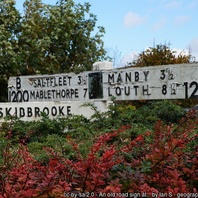
Viking Names
Saltfleetby
Saltfleetby, in the Louth Eske Wapentake of Lincolnshire, comes from the stream-name Saltfleet (Old English salt and flēot) and the Old Norse element by ‘farm, settlement’, referring to the latter’s location. There are actually three Saltfleetbys, now identified by the dedications of their parish churches, Saltfleetby All Saints, Saltfleetby St Clement, and Saltfleetby St Peter.
Read More

Viking Names
Roston
Roston, in the Appletree Hundred of Derbyshire, comes from the Old Norse male personal name Hrosskell and the Old English element tun ‘farm, settlement’. It is thus a hybrid name. Roston is a joint parish with Norbury.
Read More
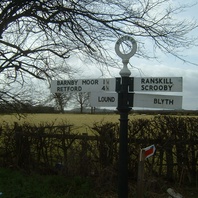
Viking Names
Ranskill
Ranskill, in the Bassetlaw Wapentake of Nottinghamshire, probably comes from the Old Norse male personal name Hrafn (which is also the word for ‘raven’) and the Old Norse element skjalf ‘seat, ledge, slope’. It is on a slight slope above the level ground.
Read More

Viking Names
Revesby
Revesby, in the Bolingbroke Wapentake of Lincolnshire, comes from the Old Norse male personal name Refr (which is also the word for ‘fox’) and the Old Norse element by ‘farm, settlement’.
Read More
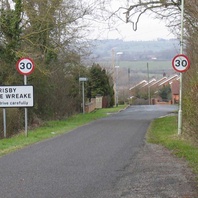
Viking Names
Frisby on the Wreake
Frisby on the Wreake, in the East Goscote Hundred of Leicestershire, takes its name from a Scandinavian form of an ethnonym Frisa (gen. pl.) ‘Frisians’ and the Old Norse element by ‘farmstead, village’. The affix ‘on the Wreake’ was added at a later date to distinguish this Frisby from another in the Gartree Hundred of Leicestershire and refers to the site’s location on the river, adjacent to Kirby Bellars. Traditionally, the place-name has been interpreted as referring to Frisians who took part in the Viking invasions. However, the exact implications of such a name are not yet fully understood and are the subject of ongoing work by Dr Jayne Carroll of the Institute for Name-Studies, University of Nottingham.
Read More
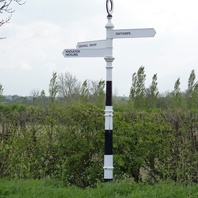
Viking Names
Owthorpe
Owthorpe, in the Bingham Wapentake of Nottinghamshire, comes from the Old Norse male personal name Úfi and the Old Norse element þorp ‘a secondary settlement, a dependent outlying farmstead or hamlet’.
Read More

Viking Names
Grainsby
The first element of Grainsby, in the Haverstoe Wapentake of Lincolnshire, is of uncertain origin. It is likely the Old Norse male byname Grein, Old East Scandinavian Gren, from Old Norse grein, Old Danish gren ‘a branch’. Alternatively the element could be the Old Norse appellative grein ‘a branch (of a tree); a fork (of a river)’. This word survives in dialect as ‘a small valley forking off from another’, but there is nothing in the topography of Grainsby that supports this sense. The second element is Old Norse by ‘a farmstead, a village’.
Read More
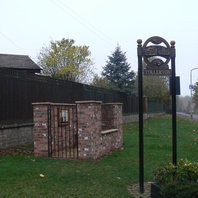
Viking Names
Tollerton
The place-name of Tollerton, in the Bingham Wapentake of Nottinghamshire, has suffered a good deal of corruption. Twelfth-century spellings of the name point to the Old Norse male personal name Þórleifr as the first element. Later there seems to have been confusion with another Old Norse male personal name, Þórleikr. The second element is Old English tun ‘an enclosure; a farmstead; a village; an estate’, making it a hybrid name.
Read More

Viking Names
Holme
Holme, in the Thurgarton Wapentake of Nottinghamshire, is a simplex name from Old Norse holmr ‘an island, an inland promontory, raised ground in marsh, a river-meadow’. This place is by the River Trent, and there are several other places by this name in the county. For more information about Holme and other place-names in the East Midlands, see the Lunchtime Talk Holme from Home? East Midland Place-Names and the Story of Viking Settlement.
Read More
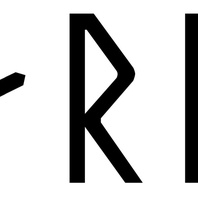
Viking Names
Gerd
The name Gerðr was found in Iceland in the tenth century, but only possibly found in Norway in place-names. It is also found in one Danish place-name. It is is the first element in the place-name Garriston, North Yorkshire and in Getheston, a field name, in Monk Bretton, West Yorkshire. Gerðr is from the Primitive Scandinavian garðiōʀ. Perhaps it is the female equivalent of the Old Norse male personal name Garðr from Old Norse garðr ‘yard, enclosure’, but used in the older sense of ‘protection’. Gerðr occasionally appears as a form of the male personal name, Giarðarr. Many female names, such as Þorgerðr are formed with -gerðr as the second element. Gerðr also appears in Old Norse mythology as the name of the giantess with whom the god Freyr falls in love.
Read More

Viking Names
Snelland
The derivation of Snelland, in the Wraggoe Wapentake of Lincolnshire, is uncertain. The first element is either the Old Norse male personal name Snjallr or the Old English male personal name Snell, the second element is Old Norse lundr ‘a small wood’.
